An AfriTAP newsletter, December 2021
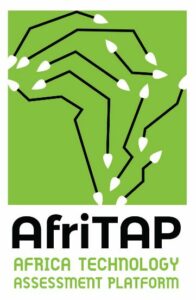
AfriTAP presents our first newsletter! This newsletter highlights developments in new technologies in Africa, in the areas of climate, geoengineering, agriculture, genetic technologies and digital technologies. We hope you find this useful. Do share this newsletter and encourage others to sign up!
What is AfriTAP? AfriTAP is the short name for the African Technology Assessment Platform. (in French PEMTAfrique, Platforme d’Evaluation Multidimensionelle des Technogies en Afrique). This is a new initiative of African and International civil society groups working together to track, understand and respond to new technologies that are re-shaping our lives and environment. AfriTAP was established by HOMEF (Nigeria), IRPAD (Mali), Terre a Vie (Burkina Faso) and ETC Group (international) and hopes to grow into a continent-wide network. Our aim is to remain vigilant with respect to which new technologies are being introduced to the continent and to ensure that civil society organizations have relevant information to be able to evaluate, strategize and organize. For more information see https://assess.technology/regional-technology-assessment-platforms/africa
This edition’s contents:
Climate Technologies
- COP26: A “death sentence” with plans to Engineer the Climate
- Geoengineering facilitated by carbon trading
- Agriculture and the US/UAE initiative ‘AIM for Climate’ Project
- Resistance from African civil society organizations
Genetic Technologies
- A New Stage in Target Malaria’s Gene Drive experiment
Agricultural Technologies
- The Plant Variety and Protection Act: Ghana
- Agroecology Map
Digital Technologies
- Fintech
- AI: Microsoft, Amazon and Facebook Capitalize on Refugee Labour
Climate Technologies
COP26: A “death sentence” with plans to Engineer the Climate
The 26th Conference of the Parties to the UN Framework Convention on Climate Change (COP26) took place in Glasgow from October 31 to November 12 2021. This last COP was the most urgent one yet, and was intended for countries to commit to ambitious emissions targets by 2030, including measures to keep the global temperature rise to no more than 1.5 degrees celsius, increase finance for adaptation and meet already existing commitments to provide $100 billion in climate finance each year for developing countries to invest in green initiatives and technologies and protect their populations against climate impacts.
Despite the urgency of this COP, it was overshadowed by interests from polluting industries. The fossil fuel sector had more lobbyists present at COP26 than even the largest national delegation, and its lobbyists were included in 27 official country delegations. Almost 30 years after the UN Framework Convention on Climate Change (UNFCCC) was signed, COP26 was still unable to commit to the phase out of fossil fuels. Several people from civil society and indigenous communities considered the final outcome of the Glasgow deal to be “a death sentence”.
Emerging technologies played a large role in the greenwash: Part of the Glasgow deal involves plans for geoengineering technologies including a declaration by the US and China to deploy Carbon Capture Use and Storage (CCUS) and Direct Air Capture (DAC) technologies as part of their climate plans. Geoengineering refers to large-scale technological schemes to intervene in the climate system through carbon dioxide removal, solar radiation management and other such risky technologies. Technologies like CCUS and DAC are still largely hypothetical or in an early stage or development and may create more emissions than they reduce. They are primarily developed and championed by the fossil fuel industry, with the effect of justifying extraction and pollution through a “net zero” framework. Corporate ‘net zero’ commitments assume that significant gains on investment in Carbon Dioxide Removal (CDR) technology development can be generated either through subsidies or new carbon markets.
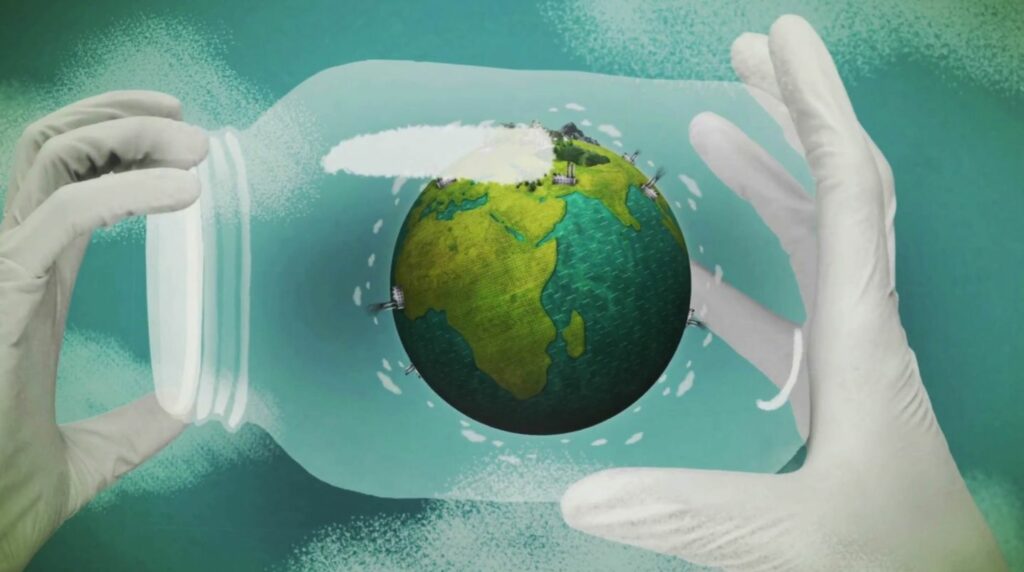 Credit: Heinrich-Böll-Stiftung : Screenshot from the video, ‘A technofix for the climate? Atmospheric geoengineering (Solar Radiation Management).’
Credit: Heinrich-Böll-Stiftung : Screenshot from the video, ‘A technofix for the climate? Atmospheric geoengineering (Solar Radiation Management).’
Geoengineering facilitated by carbon trading
Plans for the inclusion of geoengineering technologies in climate actions would be facilitated by a regulated global carbon trading market, supported by the largest polluters in the world including the US. Under this scheme, countries will try to meet their climate targets by buying carbon credits, rather than cutting emissions at their source. Carbon offset programs include so called green energy projects like biofuel monocrops and hydroelectric dams, which are linked to environmental destruction, forced displacement, arbitrary arrests and even murder. Carbon credit schemes rely on sequestering land, forests and rivers which indigenous people rely on for their livelihoods.
Agriculture and the US/UAE initiative ‘AIM for Climate’ Project
A significant initiative, launched on the sidelines of COP26, AIM for Climate (AIM4C) has to do with the relationship between climate change and agriculture. AIM4C was launched at the COP by the US and United Arab Emirates and is currently being supported by four African countries: Kenya, Burkina Faso, Morocco and Ghana. its proponents claim it could make the global food system ‘net-zero’ by 2050 through climate-focused ‘innovation’ (meaning food production based on digitalization, automation and synthetic biology technologies). But AIM4C is primarily intended to advance a new wave of high-tech industrial agriculture, reframing Big Agriculture in a positive light, attracting climate finance, and aligning it with the interests of big data companies like Microsoft and Amazon (though Amazon Web Services), which are already moving into agriculture. AIM4C threatens to ramp up land-grabbing, jeopardizing the livelihoods of smallholder and peasant farmers who feed the majority of the world’s population and are already cooling the climate through local and ecological agriculture.
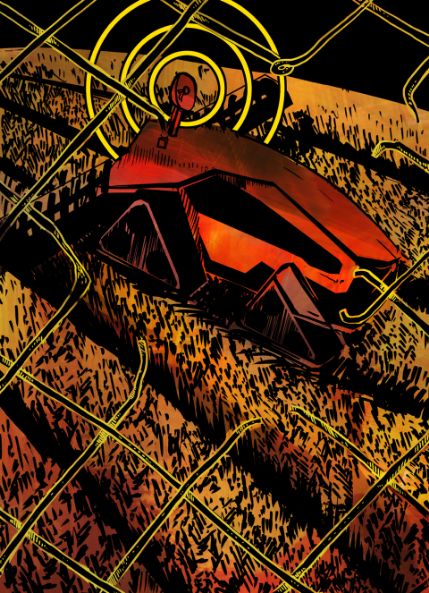 Art by Becky Green, @space_nomad_sketches
Art by Becky Green, @space_nomad_sketches
Resistance from African civil society organizations
Despite restrictions on travel and access due to high costs, a lack of access to vaccines (also known as the “vaccine apartheid”), and complex travel requirements for participants from the global South, civil society from Africa organized a counter-COP and issued a list of demands to address the urgency of the climate crisis. They called on African governments, the African Group of Negotiators, and those from the Least Developed Countries (LDC) to take note of the ways in which African continent will be especially devastated by the climate crisis and to negotiate in the interests of African people and the planet. Among their demands was a call to push for managing technology as a common good, by allowing the transfer of climate-friendly technology and localized production techniques without imposing Intellectual Property restrictions or loan conditionalities and committing to universal clean-energy, access to transportation and food sovereignty. Other civil society groups including the Alliance for Food Sovereignty in Africa (AFSA) called on African governments and negotiators to demand urgent action from historically high emitters through increased funding, higher emissions reduction targets, and shorter timeframes. They also called on governments to prioritize biodiversity protection and restoration through sustainable solutions such as agroecology.
Genetic Technologies
A New Stage in Target Malaria’s Gene Drive experiment
The controversy over gene drive mosquitoes continues in Burkina Faso where Target Malaria, a research institution which derives much of its funding from the Bill and Melina Gates Foundation (BMGF), is pushing ahead with plans to release genetically modified mosquitoes (and eventually gene drive mosquitoes), ostensibly to eradicate malaria. On October 21 2021, Burkina Faso’s national biosafety authority, the Agence Nationale de Biosécurité (ANB), approved an application by Target Malaria and the national health research institute (IRSS) for the contained use of a strain of genetically modified male mosquitoes. While the approval does not include an environmental release in nature, and supposedly restricts the experiment to the confines of an insectarium, it is nevertheless the next stage in Target Malaria’s research to eventually create and release gene drive mosquitoes. In this most recent stage, researchers will study what happens when these genetically modified male mosquitoes mate with local wild-type females.
The African Union endorsed the deployment of gene drive technologies on the continent, as did African governments at the UN United Nations Convention on Biological Diversity in November 2018. When African civil society groups at that conference called for a moratorium on the release of gene drive organisms, the African Group blocked it. Legislators around the world are currently being asked to reconsider how to regulate latest developments in gene technology, genome editing and gene silencing. Civil society organizations in Africa, including COPAGEN, Terre à Vie, the Alliance for Food Sovereignty in Africa and the African Centre for Biodiversity continue to oppose the release of genetically modified mosquitoes in Burkina Faso. Although these are not yet “gene drive” mosquitoes, civil society groups argue that the release of genetically modified mosquitoes pose unacceptable risks. There has been no published independent environmental risk assessment (ERA) for the proposed release and until now there has been no public consultation, aside from “public engagement” activities conducted by Target Malaria, without independent mechanisms to ensure the free, prior informed consent of communities concerned.
 Art by Becky Green, @space_nomad_sketches
Art by Becky Green, @space_nomad_sketches
Agricultural Technologies
The Plant Variety and Protection Act: Ghana
In November, Food Sovereignty Ghana (FSG) filed a legal suit at the Supreme Court to challenge the constitutionality of the Plant Variety Protection Act, Act 1050, 2020. The case will seek to determine if the constitution of Ghana was breached by the passage of this act and if Ghana was a party to the International Union for the Protection of New Varieties of Plants (UPOV) at the time it was passed. FSG has been at the forefront of campaigning to uphold the rights of farmers to freely save, exchange and sell farmer-saved seeds in Ghana. The claim states among others, that the UPOV 91 Convention is an unnecessary infringement on farmers’ rights. UPOV’s purpose is to oblige countries to operate laws that privatize seeds, enabling corporations to capture the world’s farmers who are currently using their own seeds with dignity and for free. Under these laws, companies get the right to extract hefty royalty payments from people and communities that grow or save protected seeds – often at a 10-12% mark-up. Governments especially in the developing countries are often under strong pressure to internalize UPOV into their legal systems either through trade agreements or direct pressure from the seed industry lobbies.
Agroecology Map
AFSA, the Alliance for Food Sovereignty in Africa, has shared a useful tool called the Agroecology Map, Knowledge and Practices, a technological platform that allows for the mapping and exchange of agroecological experiences, with the goal of bringing people together to strengthen and create new networks of collaboration in agrocecology. Although developed in Latin America and available for now in Spanish, there are some African nodes, the data is available via a free software, and it can be used and shared freely: https://mapadaagroecologia.org/
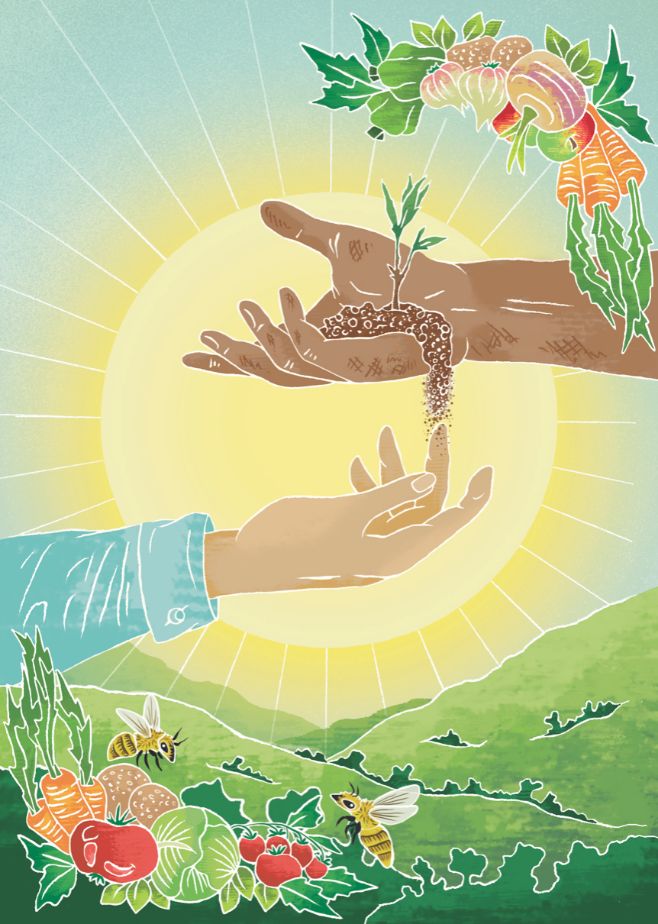 Art by Isabelle Morgan, @isabellemorgan_illustration
Art by Isabelle Morgan, @isabellemorgan_illustration
Digital Technologies
Financial technologies
Africa has recently been described as “ground zero” for a surge in fintech funding. “Fintech” or “financial technology” can be defined as banking and financial services enabled by computer programs. Perhaps the most well-known financial technology in Africa is MPESA, the mobile money transfer service which began in Kenya and is now operational in Tanzania, Mozambique, DRC, Lesotho, Ghana, Egypt, Afghanistan and South Africa. Investors from all over the world, including large corporations as well as venture capital firms from countries that have not previously invested in the continent, in conjunction with international development agencies like the World Bank USAID and DFID, are backing new startup companies in fintech. Nigeria, South Africa and Kenya are the largest recipients of African fintech funding. BFA Global’s Catalyst Fund reports that funding for African fintechs has grown from $385m in 2018 to $1.35bn in 2020. In October, Google announced a $50m fund to support African startups, while New York-based Tiger Global invested $15m in Nigeria’s Mono, and $3m in Zambia’s Union54. On the continent, three out of 7 “unicorn” companies in Africa are fintech firms: Flutterwave, OPay and Wave. A “unicorn” in the venture capital industry describes a privately held startup company with a value of over $1 billion.
While fintech is often presented as beneficial for Africa’s economic development and for job creation, critics argue that fintech will increase inequality and enrich the elite. So far, fintech technologies have had detrimental impacts in Kenya. For instance, fintech firms tell their customers that they can obtain microloans through their mobile phones, which had led to people going into debt and had also led to serious gambling problems in Rwanda, Uganda and Tanzania. Those who ultimately benefit are not the poor, but the companies behind the fintech revolution and their stakeholders. Newspapers report that mobile lending has led to a wave of problems including domestic tensions, violence, and even suicide. Many also end up in a “debt treadmill,” having to take out loans with one mobile service to repay existing debts to another lending service. The profitability of “digital debt,” relies on the precariousness of the working poor in Africa who use these services for everyday needs like paying bills or buying charcoal for a meal.
AI: Microsoft, Amazon and Facebook Capitalize on Refugee Labour
In the world of algorithms and machine learning, it is essential to have training data, which is the data used to train an algorithm or machine learning model to predict an outcome, to improve its performance. For instance, in order to train autonomous or “self-driving” vehicles, companies need pictures of the road, as well as labeled images of cars, pedestrians and street signs. In order to annotate and label their data and complete data tasks in order to train their algorithms and machine learning projects, many companies are outsourcing this labour to the global South, and in particular to refugee camps. In Africa, the non-profit Sama, for instance, trains refugees in Kenya and Uganda to complete data tasks and recruits refugees to work on Amazon’s Mechanical Turk. This kind of clickwork or microwork pays very little to the workers, offers no job security, and takes place in small cramped workspaces. Yet, these refugees are helping to improve machine learning capabilities for the largest companies in the world: Microsoft, Amazon and Facebook. Phil Jones writes that “microwork programs often target populations devastated by war, civil unrest, and economic collapse, not despite their desperate circumstances…but because of them.”
How to subscribe, join and grow the AfriTAP/PEMTAfrique network
This is the first of what we hope will be a regular quarterly newsletter sharing critical news and views about new technologies in Africa. If you would like to receive our upcoming newsletters and.or join the AfriTAP network, please write to zahra@etcgroup.org , kebede.yodit@gmail.com or mfoniso@homef.org. We will be putting together a mailing list for future news and information. If you have feedback or comments to help us improve this newsletter or if your organization would like to become more involved with AfriTAP/PEMTAfrique, please write to us. Please do share or repost this newsletter.
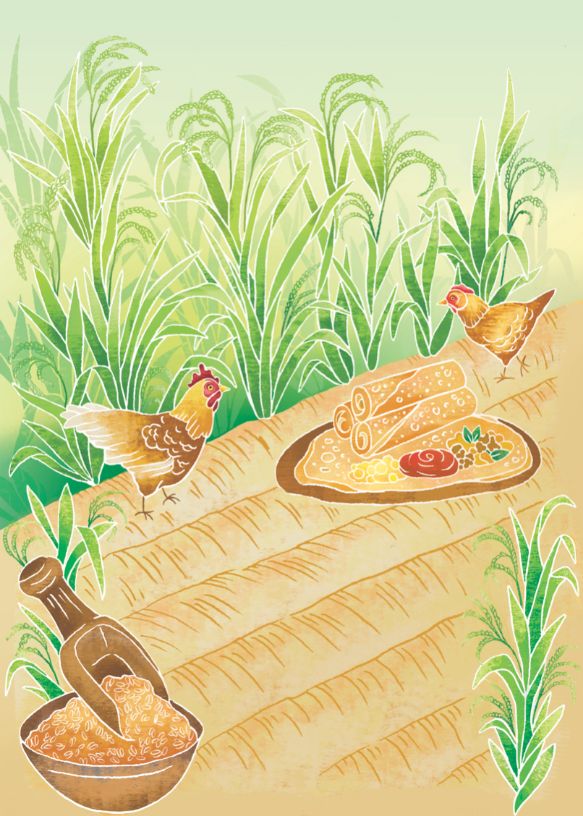 Art by Isabelle Morgan, @isabellemorgan_illustration
Art by Isabelle Morgan, @isabellemorgan_illustration

